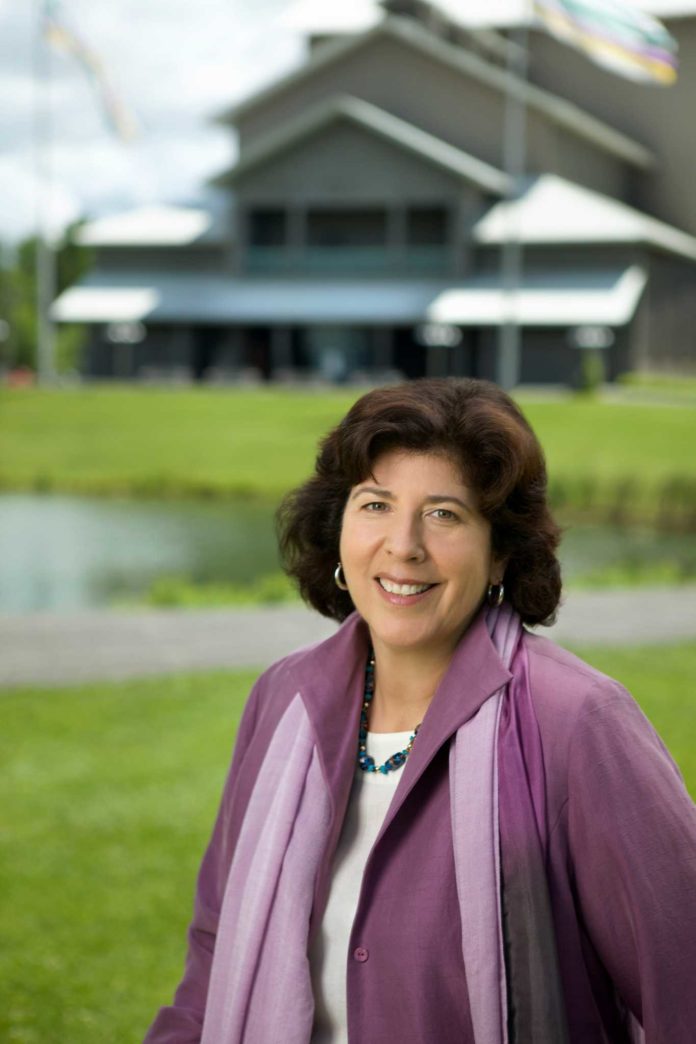
When Francesca Zambello leaves her position as general and artistic director of the Glimmerglass Festival at the end of August, she’ll still maintain ties to the region, including a partnership in a real estate development that she started in early 2020. The business’ first project, a newly constructed 13-unit energy-efficient apartment building in the heart of Cooperstown, is expected to open in the fall.
“Housing is a problem in this area and I’ve always been painfully aware of the economic issues in the area. I wanted to provide more housing because housing brings people here and creates other businesses,” says Zambello.
Our interview took place prior to a matinee last month while sitting at one of her favorite picnic tables on the festival grounds. While Zambello will continue as artistic director of the Washington National Opera, she admitted that it’s feeling good to step away, at least a bit, from nonprofit work.
Her real estate company is named Zaed Properties, a contraction of her last name and that of her business partner Joshua Edmunds, who runs his own construction firm. Their new building, Chestnut Crossing, has drawn 60 applicants. Their second project, already underway, involves historic preservation in the town of Richfield Springs, where they’re converting a former bank into 10 lofts. A third project, also in Cooperstown, is already on the drawing board.
Real estate might seem an unexpected avenue for the 65-year-old Zambello, who was born in New York, raised in Europe and speaks five languages. But multitasking is an essential skill for an opera director and Zambello was one of international renown for several decades before taking the reigns of Glimmerglass 12 years ago. Her tenure has been replete with new initiatives and partnerships.
But there’s more than real estate deals keeping Zambello in Otsego County. She and her wife, Faith E. Gay, plan to maintain their home in Cooperstown. “We’ve been involved here, we love it here, and have a lot of friends that have nothing to do with the opera,” says Zambello. The couple also has residences in Washington and New York and their teenage son Jackson attends the Dalton School in New York City.
Gay, a litigation attorney with her own firm in Manhattan, is also recognized for striking out in new directions and taking on leadership in the community. Some years back she established a legal clinic, primarily for DACA children, at First Presbyterian Church in Cooperstown where the couple are members. While maintaining her law practice, Gay earned her master’s in divinity at Yale University – “for fun,” as Zambello puts it.
Once COVID set in, their church found itself without a minister and the recently ordained Rev. Gay became interim pastor for 14 months. “I was the pastor’s wife,” recalls Zambello. Gay is also a licensed pilot and according to Zambello, she’s establishing a small “flying business” with some other pilots in Saratoga Springs. “They’ve purchased some planes and will be doing bespoke travel, dropping people in the Adirondacks and various places,” says Zambello.
When asked to look back on her work with Glimmerglass, Zambello doesn’t reminisce about memorable performances or special guest artists. As in past conversations, she discreetly turns the discussion from opera to people and community: “I’ve always said we’re here to create a bridge, we’re here to create dialogue. We create shows so people can talk about them and talk about the ideas, whether they’re serious or you put it down to entertainment. I’ve always said we’re a service industry.”
Zambello’s first priority at Glimmerglass was to create the festival atmosphere, spreading the word that’s there’s more going on than just opera. She explains: “You can’t sell opera. You have to sell the experience. You come here, you meet your friends, you have a picnic, read the program and hear a lecture. It’s about the experience. People don’t want to say we’re going to ‘Tosca’ tonight. I want them to say they’re going to the Glimmerglass Festival.”
Her second order of business was to make the organization more connected to the community and more socially responsible. Establishing the youth opera program was a big step toward the former, while the latter manifested most obviously in bringing music to Attica prison and presenting works like “Blue,” the commissioned opera from 2019 about Black youth.
As for bringing diversity to the sizable team of artists, apprentices, technicians and administrators that comprise the company, Zambello says that it goes without saying. But apparently, she did say some things when she arrived. “That first season I said to the man who was running the young artists programs, the company is very white and very male and we’re going to change that rapidly. We did and always a third of the young artists represent what we now call BIPOC. Among the production teams, there’s gender diversity, sexual diversity, everything. That’s been very important.”
COVID, of course, thwarted the best-laid plans. This year’s season finally saw the long-planned production of “The Sound of Music,” which was originally scheduled for 2020 when no performances took place. Last summer, the company offered a handful of modest productions on a newly built outdoor stage. In an impressive feat of technology, the singers were supported by a live orchestra performing some distance away on the stage of the Alice Busch Opera Theater.
If Zambello wasn’t already viewed as a hero, pulling off “Glimmerglass on the Grass” certainly earned her the distinction from many. But here again, she’d rather talk about the people than shows. Looking back on 2020 she says: “We paid everyone who would have worked here, apprentices included. Everyone. I’m very proud of that.”
Yet COVID still lingers and ticket sales have been slow to recover. According to Zambello, income from admissions was 40 percent of normal in 2021, although the novelty of the outdoor stage did lure a number of first-time visitors. For this season, sales are roughly 60 to 65 percent of pre-pandemic numbers, though Zambello gave that estimate during our interview at the start of the third week of the seven-week season.
“People are not going out,” she says. “Last weekend, we had four performances of ‘The Sound of Music,’ and if it was 2019 they’d have been sold out. When I look back at ‘West Side Story,’ ‘Porgy and Bess’ and ‘Showboat,” all these shows sold out 12 to14 performances.”
Nevertheless, Zambello says the company is in good form, artistically strong with a budget in the black, which should be reassuring to her successor, Robert Ainsley. “He’s being handed a good situation,” she says. That wasn’t the case when Zambello took over from Michael MacLeod at the end of the 2010 season.
“When I came here, it was kind of not in a great place,” recalls Zambello. “I was at a point that I wanted a career change and I’d been offered to run a lot of companies. I got a call out of the blue from the then-chairman, who I knew. And I thought this is exactly what I want, because it’s not just the festival but it’s the young artists and apprentices and creating the next generation. That was why I immediately said yes. It was a very quick thing. They basically fired Michael and hired me in a week. For my first season in 2011, he had done nothing. He was gone and left the place rudderless, so I had to start at the ground up.”
Though there’s been no big announcement of the 2023 season (the kind of rollout that includes names of principal singers, conductors and directors), the basics are listed in the back of this year’s program book. The festival will run July 7-Aug. 20 and have four operas: Bernstein’s “Candide,” Puccini’s “La Boheme,” Handel’s “Rinaldo” and Gounod’s “Romeo and Juliet.” It’s a fairly conservative season, at least by recent standards. At the behest of the board, the slate was decided by Zambello with input from Ainsley, who’s wrapping up his tenure at the Washington National Opera where he led the Cafritz Young Artists Program and the American Opera Initiative.
Asked if she’s offered any advice to Ainsley, Zambello says, “A lot of it is pragmatic about the budget and the schedule. The main thing, and he’s completely on this page, is creating community through art. He’s been doing a big amount of that in Washington. And I think he has to find his own voice.”
Ainsley is already on the scene. He was spotted at a recent performance and is apparently mindful that Zambello is leaving big shoes to fill. During intermission, he was overheard introducing himself to a couple of folks by saying, “I’m the new Francesca.”
Joseph Dalton is a freelance writer based in Troy.








